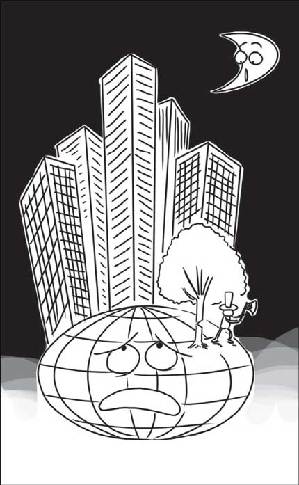Planetary ecosystem unraveled by greed
 0 Comment(s)
0 Comment(s) Print
Print E-mail Shanghai Daily, April 25, 2012
E-mail Shanghai Daily, April 25, 2012
|
|
|
[By Zhou Tao/Shanghai Daily] |
This year, Earth Day fell just two months before the Rio+20 Summit (UN Conference on Sustainable Development) on June 20-22 that will discuss how to respond to the growing environmental threats.
But nothing being undertaken by Earth Day nor the Rio+20 Summit identifies the challenge adequately, let alone the steps that nations and particularly cities must take. Why?
When Earth Day was created in 1970, and at the 1971 United Nations Stockholm Environment Conference, there was little understanding of the ways in which our global system of production, distribution and consumption, namely capitalist globalization, was unraveling the planetary ecosystem.
Pollution was not viewed as threatening the well being of every ecosystem and every species on the planet.
Now, four decades later, the threat has severely worsened. One reason for this is how the corporate media have addressed the issue.
CNN talks about "Eco Solutions," which of course, do not resemble anything like a solution. What can be done is hardly what must be done to reverse the tide of destruction.
Rush to oblivion
The very concept of a Green Economy has more to do with how US corporations enhance profits than reduce footprints.
But the most fundamental issue in this rush to oblivion is not the long-term consequences of global warming, the carbon count, the most severe species extinction ever known or individual lifestyles, but the short-term exponential growth of the planetary footprint.
Affluent consumers in cities are recklessly consuming the planet's assets perhaps 18 times faster than the planet can replenish. Worldwide consumption uses one third more than nature can replenish.
One pivotal concern is what the United Nations 2011 Human Development Report called Sustainability and Equity.
The report argues that "sustainability and equity must be addressed together." It is evident that countries and corporations are inclined to parade their measures for "sustainability" while equity continues to decline worldwide.
Unless far greater equity is achieved - and there is no prospect for that - growing inequity will make addressing issues such as the urban footprint, impossible.
The social cohesion required to reduce and balance footprints is impossible when well-being is imperiled by growing inequality.
None of the individual "green" actions now being pursued will amount to virtually any change in the qualitative nature of the dangers and risks we face.
Reversing the patterns of imbalance between global and planetary forces will require profound changes in the social order in most countries.
It will require some countries to dramatically reduce their footprint (which they will not do voluntarily) and other countries to increase their footprint.
Just consider one city. For the footprint of London to be sustainable, it has been calculated that it must reduce its consumption by 35 percent starting in 2020. If that were taken seriously, there would be no 2012 Olympics. Nor can one imagine a similar reduction in either the United States or China.
The greed of US consumption will not subside, and the need to improve the well-being of the Chinese people is appropriate.
The Rio+20 Summit promises more of the same inadequate analysis and action. The conference will focus on Green Economy initiatives. This is nothing but a euphemism for expanding global markets and unchecked urbanization.
The UN was created to empower nation states. Cities were ignored. Today, cities are pivotal in any reversal of environmental ruin, but have no power within the United Nations.
Barry Weisberg was a reporter for Chicago Public Radio and an adjunct professor at Hong Kong University and the University of Illinois at Chicago. He is the author of "Beyond Repair, The Ecology of Capitalism" (1969). Contact: barryweisberg@att.net. The views are his own. Shanghai Daily condensed the article.







Go to Forum >>0 Comment(s)